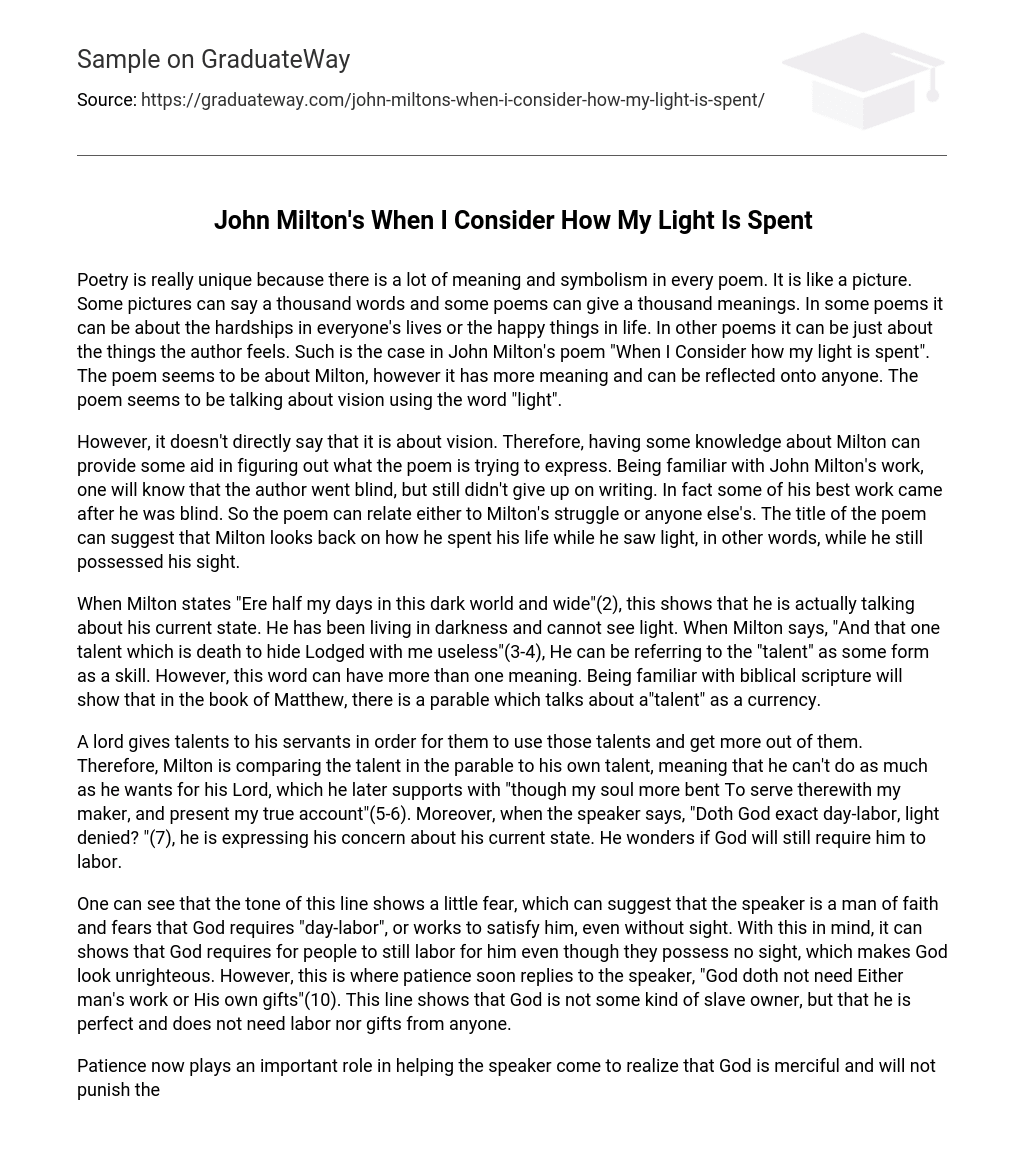Poetry is unique in that it holds a multitude of meaning and symbolism in each verse, much like a picture. As certain pictures can convey a thousand words, poems have the power to evoke countless interpretations. Some poems delve into the hardships and joys experienced by individuals, while others express the personal sentiments of the author. John Milton’s poem “When I Consider how my light is spent” exemplifies this concept. Although seemingly about Milton himself, the poem possesses a deeper significance that resonates with anyone who reads it. Central to the poem is the theme of vision, symbolized by the recurring motif of “light”.
However, the poem doesn’t explicitly state that it is about vision. Therefore, having some knowledge about Milton can help in interpretation. Knowing that John Milton lost his sight but continued to write can give insight into the poem’s meaning. It could be about Milton’s own struggle or the struggles of others. The title suggests that Milton reflects on his life when he had vision, or when he still had the ability to see.
Milton’s statement “Ere half my days in this dark world and wide” (2) indicates that he is discussing his current state of living in darkness and being unable to see light. Additionally, when Milton mentions “that one talent which is death to hide Lodged with me useless” (3-4), he may be referring to a skill or ability. It is worth noting that the word “talent” can have multiple meanings, one of which is a form of currency mentioned in the book of Matthew in biblical scripture.
In the parable, a lord bestows talents upon his servants with the expectation that they will utilize and multiply those talents. In drawing a comparison to his own ability, Milton suggests that he is unable to fully satisfy his Lord’s desires, as evidenced by his affirmation that he yearns to serve his maker and give a truthful account of his actions. Furthermore, when the speaker questions whether God demands labor in the absence of illumination, it reveals his apprehension regarding his present circumstances and whether he will still be obligated to toil.
The speaker in this passage displays a sense of apprehension, suggesting that he is a devout individual who fears God’s expectations for labor even without the ability to see. This implies that God may appear unjust by requiring work from those who are blind. However, the speaker is countered by patience, which responds with the reassurance that God does not require labor or gifts from humans. This statement highlights that God is not a demanding master but rather perfect and self-sufficient.
Patience plays a crucial role in helping the speaker realize that God is merciful and will not punish them for not laboring for Him. Additionally, Patience mentions that God’s state is kingly and that thousands obediently carry out His commands. This suggests that God already has numerous loyal servants who possess the ability to serve Him with power and light. By describing God as “kingly,” it emphasizes that He is not just a lord, as mentioned in the parable of the lord in Matthew, but a fair and compassionate king who shows mercy to those who are unable to work for Him due to their loss of light.
The concept of the word “yoke” can convey a distinctive meaning regarding God’s selection of his servants. A yoke serves as a tool utilized on farm animals to guide them in their tasks. Patience explains, “Who best bear His mild yoke, they serve him best” (11). By using the term “mild,” it suggests that God’s yoke does not transform individuals into his personal slaves. Instead, it signifies that those whom God chooses willingly submit to him and allow him to guide and steer them.
In summary, the speaker expresses deep concern about displeasing the lord, emphasizing that being blind is akin to being dead as it severely limits one’s abilities. Additionally, the poem’s message is applicable to anyone, not just Milton, and delivers a powerful insight into the nature of God. Rather than simply a lord, God is depicted as the king of the earth with numerous servants carrying out his commands. Consequently, he shows mercy towards those with physical disabilities or obstacles in their path to serve him.





